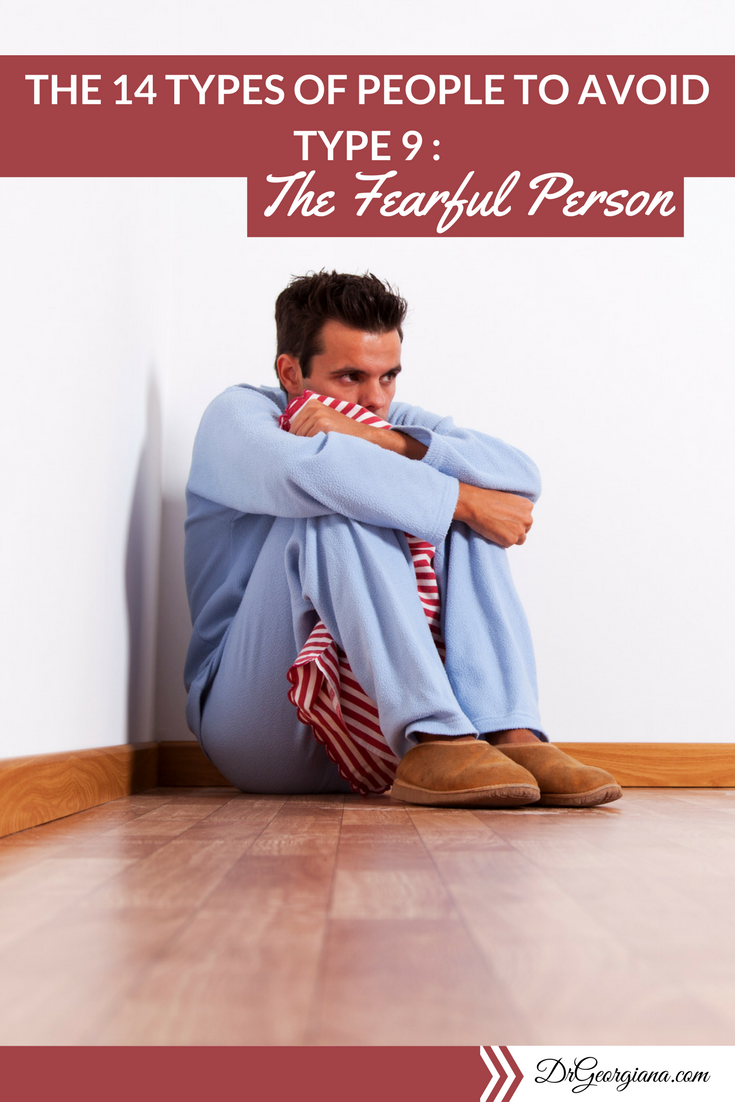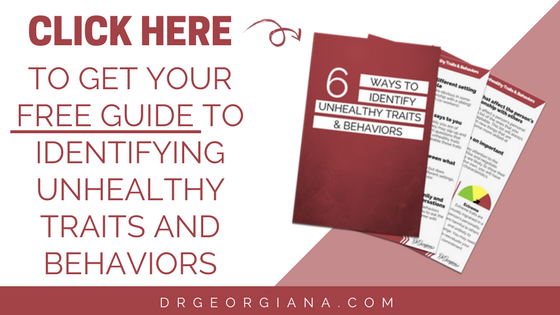
Are there people in your personal or professional life who have traits or behaviors that you consider unhealthy? If so, do you wish you would have known how to spot them sooner?
Welcome to the Dr. Georgiana Relationship Series: “The 14 Types of People To Avoid”. In my previous segment, I pointed out the many warning signs of The Jealous person that can bring emotional unrest to your life. In this segment, I am going to discuss The Fearful individual.
This segment is in response to an email I received from Mary Jane from San Francisco, California with the following question:
“Dear Dr. Georgiana:
Dave and I have been friends for a long time but only recently started dating. Our relationship is based on friendship, shared memories and genuine caring for each other. My problem is that I am always the one making important decisions and taking risks. Dave is very smart but he has always been very resistant to change. As a result, I am the one who comes up with new ideas to make our relationship interesting. He is usually Ok with what I decide as long as I don’t pressure him to make up his mind. If I insist that he makes a decision, he often becomes annoyed, teases me or raises his voice. When we were just friends it wasn’t much of a problem because we saw each other once in a while. But now that we are considering marriage I am a lot more worried. Recently he asked me to help him choose a new car. He had a list of options and wanted me to call the dealerships because he did not think he was a good negotiator. We finally went to a dealer and on the way there he kept talking about all the negative reviews he had read about the brand he was considering buying! When we arrived at the dealership, guess who was in charge of negotiations? Me of course. He is often worried about getting hurt by people and has broken up friendships because “they relied too much on him”. He is often self-critical but expects me to tell him that he is doing things right, dislikes change and confrontations and has a hard time managing emotions. I don’t know if his indecisiveness is a trait that he can change and I am really uncomfortable being in a long term committed relationship with someone who behaves like that. What do you think?”
Mary Jane, it seems that you are dating someone who is deeply fearful and avoids making decisions at all costs. Fear is an emotion induced by a perceived threat, which causes a person to quickly pull away from it and hide. A fearful person experiences fear in many situations that do not actually pose a threat to him or her.
Here are 15 of the characteristics of a fearful/avoidant person that Dave presents:
He:
- Often worries he will get hurt if allows someone in
- Avoids relationships
- Has a negative view of himself
- Often fails to gather all of the facts
- Gets angry when stimulated to action against his will
- Puts up stubborn opposition to change of any kind
- Teases people that annoy or threaten to motivate him
- Has difficulty in making decisions
- Blames others instead of acknowledging his fear
- Has a negative view of self and/or others
- Needs constant approval (relies on others to maintain a positive self-view)
- Is dependent (even though initially reluctant to attach)
- Has difficulty building trust
- Assumes a passive role
- Tends to avoid conflict
Mary Jane, it seems that you are getting caught in a role that you do not like. Most people who are in relationships with extremely fearful individuals end up feeling suffocated, blamed, alone, and/or unloved. They also tire of being forced to constantly explain themselves, show appreciation, reassure, and/or lead. If you are beginning to feel this way, you have to look at what you can do differently. It is important for you to determine if Dave is aware of his fear, of the impact that it has on his life and on you and if he has the willingness and capacity to change. If you answer to any of these questions is no, you are facing an uphill battle in your relationship, as it is unlikely that he will change and there is a high likelihood that you will constantly struggle between feeling sorry for him and wanting to leave him.
In general, a valuable way to respond to a fearful person is to help the person master their own doubt and fear – which can mean “to help him by not helping.” It is important for you to respond with empathy but not to become over-empathic to the point of feeling that you are not getting your own needs met. If you sacrifice your needs “too much” to protect your anxious partner, you risk “enabling his fear, and discounting yourself. “Too much” will depend on the situation. Try the following: every time that he is unable to make a decision or take charge of a situation that you feel is his responsibility, ask yourself what YOU need at the moment and gently and empathically put the responsibility back on him.
I hope that Dave will be able to see the impact of his fearfulness and indecision on you and that you will have a chance to continue to develop a healthy and satisfying relationship together. Although his indecisiveness and fearfulness seems to be an ingrained trait, he may be able to change. If he does not address his issues, I would suggest that you step out of the relationship.
Mary Jane, I want to thank you for sharing your experience with me and giving me an opportunity to advise you. To everyone following the series, I am honored to be part of your journey to find the right partner. I look forward to sharing future articles with you, connecting in one of my online relationship programs, or having a personalized Relationship Coaching session.
If you have been successful at spotting unhealthy people before they created too much pain in your life, please share your wisdom in the comments’ section below or on my Facebook page. You can see the answer to many of my subscriber’s questions and be notified when I post new articles by signing up to receive my online news bulletin at www.drgeorgiana.com.
ABOUT THE AUTHOR
Author Georgiana Spradling, Ph.D., MFT, CDVC, is a multicultural and multilingual (English, Spanish, & French) Emotional Intelligence Relationship Coach with over 20 years of experience helping people choose the right partners and avoid the wrong ones, manage emotions and behaviors in self and others, leave unhealthy partnerships, and move past old relationships. She is a Certified Domestic Violence Counselor and has a Certificate as an Anger Management Facilitator. Her e-book: “Don’t Get Stuck with the Wrong Partner: Learn to Detect Unhealthy Traits and Behaviors in Others” is available on the Amazon Kindle. You can subscribe to her videos on the undesirable sides of dating, committed relationships, separation and divorce on her YouTube Page.
Dr. Georgiana coaches on the telephone, online or in her office in San Francisco (USA) and offers a FREE 25-minute Consultation. She can be reached through her website: www.drgeorgiana.com, by e-mail: gs@drgeorgiana.com
